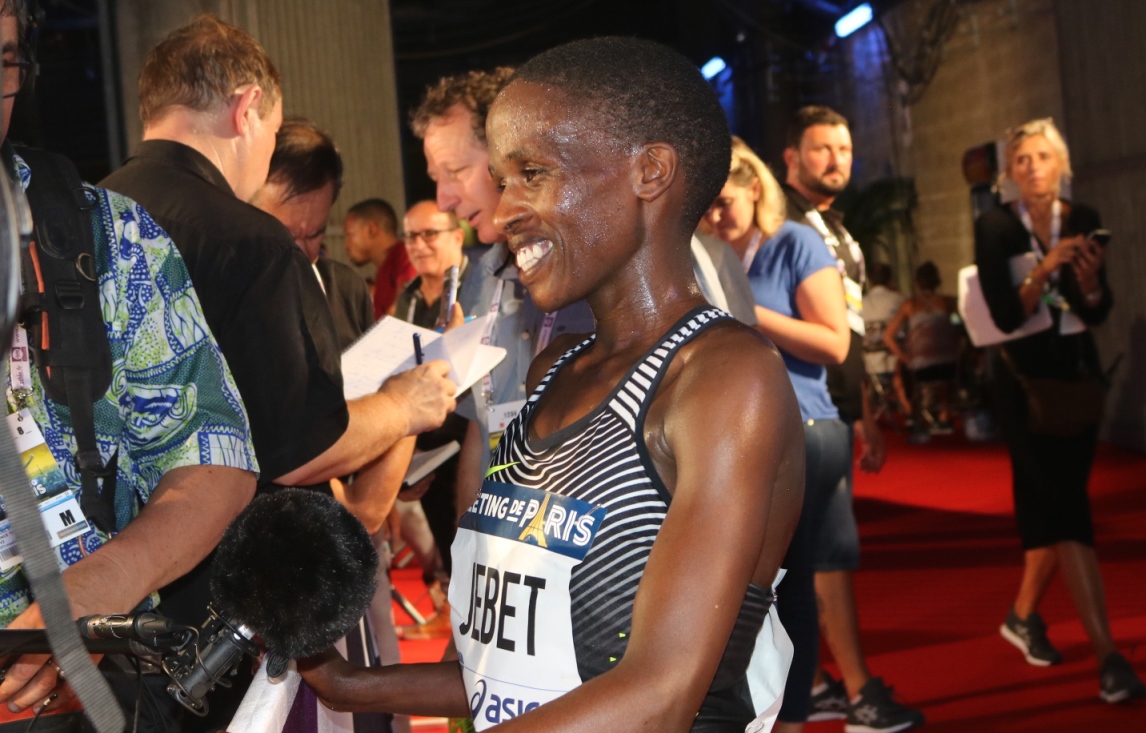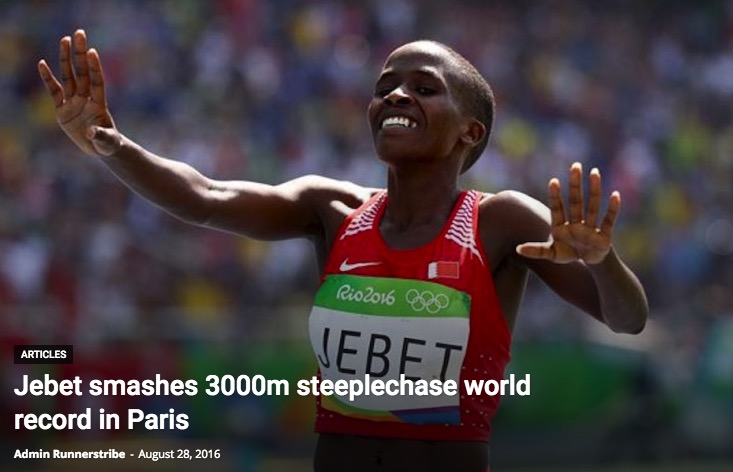By Chris Lotsbom, @ChrisLotsbom
(c) 2016 Race Results Weekly, all rights reserved
PARIS (27-Aug) — The Meeting de Paris IAAF Diamond League here was a distance runner’s dream, with records falling left and right. Ruth Jebet smashed an eight year-old 3000m steeplechase world record by a country mile; Laura Muir startled many by eclipsing her British record over 1500 meters in a world-leading time; Yomif Kejelcha set a world under-20 record for 3000m; and Alfred Kipketer clocked the third fastest 800m time of 2016.

“Fantastic. Just fantastic,” was the way IAAF President Sebastian Coe described the evening, shortly after congratulating Jebet and Muir on their times. Fantastic, in reality, was an understatement when looking at results as a whole. They were remarkable.
It was only a matter of time before Jebet broke Gulnara Galkina’s world record of 8:58.81, having twice run within two seconds of the time this season. The shy 19-year-old, born in Kenya but now representing Bahrain, said on Friday she was not going to chase the mark here, tired from her run to an Olympic gold medal earlier this month. Whether Jebet was playing mind games with her competitors or simply downplaying her fitness level, we can only guess.
“I am happy. I am happy to be a record holder and a winner,” Jebet said. “I recovered the energy. You know, sometimes you can become weak and not realize you are strong.”
Hitting one kilometer in 2:56.36, Jebet joined pacemaker Caroline Tuigong at the front just ahead of Hyvin Kiyeng. Jebet soon left the designated pacers, Tuigong and Aisha Praught –as well as Kiyeng– behind, running full steam through 2000m in 5:54.16.
Jebet’s form began to falter slightly over the final two and a half laps, though her 50 meter lead would never be in jeopardy. On the infield, Tuigong yelled encouragement as the crowd’s roars increased with the announcement that Jebet was well under world record pace.
The clock stopped at 8:52.78 as Jebet raised her hands and jumped into the outstretched arms of Tuigong. She’d slashed more than six seconds from Galkina’s world record and bettered her lifetime best by nearly seven seconds.
“I tried many times to beat the world record and today we decided to push each other to go for a good time. The pacemaker was very strong,” she said. “I was not expecting such a big difference with the record.”
Jebet was expected to try and run under 8:58 at the Herculis Meeting on September 1, in Zurich, the IAAF Diamond League final for the women’s steeplechase, but now she does not plan to race there.
“I am not planning to run. Me, I am tired. I tried my best,” she said. “I am happy to close my season with a world record.”
Kiyeng was second in 9:01.96 followed by American Emma Coburn in 9:10.19. The top three places were an exact match from the Olympic final in Rio de Janeiro.
“I’m happy for [Jebet] and I hope that over the next few years I can close the gap to her because she’s setting new barriers for herself, so I hope to join her there,” said Coburn. “I’m pleased with my race. I ran 9:10, which other than Rio would have been an American record. I’m really happy with it.”
American steeplechasers had a strong breakthrough in this race. Coburn led the chase pack for the better part of two kilometers, finishing within three seconds of her American record time (9:07.63). She helped lead Stephanie Garcia and Colleen Quigley to new personal bests (9:19.48 and 9:20.00, respectively), making them the fourth and fifth fastest Americans ever at the distance.
Australia’s Genevieve LaCaze set an Oceania Area Record with her 9:14.28 sixth place time.
If Jebet’s world record wasn’t enough, the women’s 1500m that followed 20 minutes later was filled with nearly as much excitement. Britain’s Laura Muir and Olympic gold medalist Faith Kipyegon stuck close to pacers Tamara Tverdostup and Judy Kiyeng through 800m (2:09.24), setting up a quick run for home while Americans Jenny Simpson and Shannon Rowbury sat back in the pack.
Racing aggressively in the Rio 1500m Olympic final, Muir wound up fading to seventh and missed a medal because she couldn’t kick hard in the final 400. Tonight she’d duplicate her aggressive style early, while at the same time, conserve enough energy to kick at the end. Kipyegon and Sifan Hassan both were charging hard in the final lap.
With 200m to go Muir maintained form and shut the door on any thoughts she’d tie-up in the homestretch. On the strength of a sub-60-second last lap, she’d take home her second Diamond League victory of the year in 3:55.22, break her own British national record, record a world-leading time, and break the meet record.
“I really didn’t know what to expect today. I would have been happy to run four minutes, but to run 3:55, I’m so shocked there,” Muir said. IAAF President Coe would come over to Muir and personally congratulate her on the run, saying that he was happy it turned out better than the disappointment in Rio. “It’s a bit bittersweet I guess cause it’s great to be in such phenomenal shape while at the same time I wish it was a week ago!”
Kipyegon was second (3:56.72); Hassan third (3:57.13); Rowbury fourth (3:58.00) and Dawit Seyaum fifth (3:58.09). Simpson (sixth, 3:58.19) and Besu Sado (seventh, 3:59.96) rounded out those who’d dip under four minutes.
“Nothing lights a fire like the Olympic Games, both before and after,” Simpson said. “[Muir] is a tough runner. She was great before and I’m not surprised she was great today.”
“I think in a way it was probably fun for Laura to be able to go out and show how fast she was, and same for me, to get a season’s best,” said Rowbury. “I know I’m in shape for [an American record]. In retrospect I think today probably would have been a good day to try and get it but I didn’t anticipate it being that quick.”
The men’s 3000m was fast from the gun, with an opening kilometer of 2:29.7. Morocco’s Abdelaati Iguider would be all alone out front once the two rabbits stepped off, in no man’s land some five seconds up on the field.
Yet surprisingly, Iguider kept the lead strong through the second kilometer and found himself five seconds ahead at the bell.
That bell spurred on Ethiopian teenager Yomif Kejelcha to begin tracking down Iguider little by little. Iguider glared at the stadium’s video boards and seemed to know his demise was coming.
Kejelcha made the winning move with 110 meters left, opening a nearly two second gap to win 7:28.19 to 7:30.09. Kejelcha’s time is a new world U20 record, taking down Augustine Choge’s 7:28.78 time by half a second. It is also a world leader for 2016. In his euphoria, Kejelcha ran through the mixed zone not stopping long enough for a comment.
Olympic 5000m bronze medalist Hagos Gebrhiwet was third in 7:30.45. American Ryan Hill took fourth (7:30.93) after moving up well in the final two laps. Paul Chelimo, sporting the U.S. Army kit in his first race since securing Olympic silver, faded to eighth (7:37.98).
Hill was within two seconds of Bernard Lagat’s American record 7:29.00, a mark he wants badly.
“I probably just needed a little more of an exceptional performance to get to that American record level,” he said. “It’s one of those [races] where I’ll be happy with the way I ran it. If it was just a different race… I maybe could have had a 28 in me the last 200.
Alfred Kipketer, 19, broke 1:43 for the first time with a 1:42.97 winning performance in the 800m. The race came down to a sprint in the last 20 meters, with both Jonathan Kitilit and Ayanleh Souleiman fading. That opened the door for hard charging Kipketer and Taoufik Makhloufi to run for the top spot.
It would be Kipketer’s by a tenth of a second, 1:42.87 to 1:42.98. Kitilit (1:43.05), Ferguson Rotich (1:43.43) and Souleiman (1:43.52) finished out the top five.
“This is my first time running 1:42 and I can say this is a good place where I can run a fast time,” said Kipketer. “My hopes were to improve my time. The weather was so nice and I really enjoyed it. That was so nice for me.”
American Boris Berian stepped off the track just over 400 meters in after a nagging Achilles injury flared up. Berian said that the injury has been bothering him since March, yet he’s been able to run through it for a long while.
“I’ve been kind of having issues with it, nothing where it’s affected me race wise or too much in training. But today I felt it for the first time in a while. It’s not bad but it worried me a little bit,” he said. “I maybe should shut it down. I’ve had a good year. I’m happy with it.”
A total of 24,421 spectators attended the Meeting de Paris, filling the Stade de France to roughly 30-percent of its capacity.
END
Resluts-
More reading-


Comments are closed.